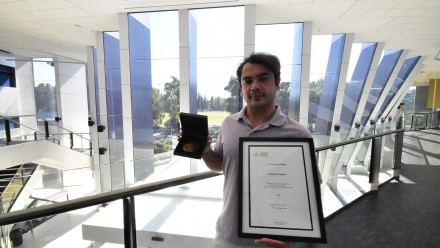Dissecting the molecular events during nuclear reprogramming
Lecture Synopsis
One of the greatest promises of regenerative medicine is the theoretical ability to reprogram any cell type of the body into any other cell type. Two different approaches can be used for the generation of patient-specific cell types: 1) Induced pluripotency, which entails the reprogramming of adult cells into a pluripotent state (iPS cells), followed by the differentiation of the iPS cells to the desired target cell type, and 2) Transdifferentiation, which is the reprogramming of one adult cell type to another without traversing through the embryonic pluripotent state (ESC/iPS). However, despite the great therapeutic potential of these reprogramming approaches, major hurdles delaying the clinical delivery of this promise are the fact that these processes have low discovery rates, are not well understood, and that differentiation of iPS cells into fully functional somatic cells is still a challenge. During my presentation, we will explore how we have addressed these problems by unveiling the molecular mechanisms of these reprogramming processes that result in new regenerative medicine strategies.
About the Speaker
Jose Maria Polo was born in Buenos Aires, Argentina where he graduated from Buenos Aires University as a Biochemist. In 2002, Jose began his graduate studies at Albert Einstein College of Medicine, New York under the supervision of Dr. Ari Melnick where he worked on the transcriptional mechanism of the BCL6 repression complex in lymphomagenesis and B-cell maturation. In 2008 he obtained his PhD and moved to Boston to the laboratory of Dr. Konrad Hochedlinger at the Harvard Stem Cell Institute to work on reprogramming of adult cells into induced pluripotent stem (iPS) cells. In particular, his work focused in the acquisition of immortality and the existence of epigenetic memory during reprogramming.
In June 2011, Jose established his independent research group at Monash University, where he holds appointments to the departments of Anatomy and Developmental Biology and to the Australian Regenerative Medicine Institute. In 2012, Jose was awarded a NHMRC Career Development Fellowship, in 2014 a Charles Viertel Senior Medical Research Fellowship and in 2018 Future Fellowship to continue his work in the molecular mechanism governing the reprogramming process and the epigenetic mechanism underpinning cell fate. In 2016 he co-founded Mogrify Ltd to translate reprogramming technologies into therapies. His work has being recognised with several awards including the American Society of Haematology Merit Award, the National Stem Cell Foundation of Australia Metcalf Award, Victorian Young Tall Poppy award as well as the Monash’s Vice-Chancellor award for Excellence in Research in 2014 and Vice-Chancellor award for Diversity and Inclusion in 2017.












